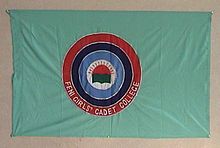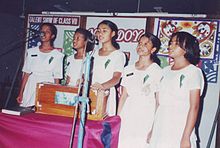
Feni is a coastal district situated in the south-east of Bangladesh, within the Chittagong Division. One of Bangladesh's smallest districts, it is strategically located along the Dhaka–Chittagong transportation corridor. Bordered by India to the north and the Bay of Bengal to the south, it serves as the sole entry point linking Chittagong, the country's primary port city, to the northern districts.
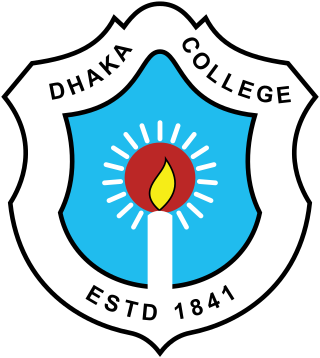
Dhaka College, also known as DC, is a public educational institution of Bangladesh located in Dhanmondi, Dhaka. It is one of the oldest educational institutions in the subcontinent. It offers honours and master's programs which are affiliated with the University of Dhaka. It also has higher secondary certificate (hsc).

Notre Dame College, Dhaka, also known as NDC, is a higher secondary and degree level educational institution founded and managed by the priests of the Congregation of Holy Cross located in Dhaka, the capital of Bangladesh. Upon the invitation of the then East Pakistan government after the partition of India, St. Gregory's College was founded on 3 November 1949, as an expanded iteration of St. Gregory's High School in Laxmibazar, Dhaka. This was undertaken by the Roman Catholic priest community at the initiative of Archbishop Lawrence Graner and the decision of the Congregation of Holy Cross. In 1954, the college relocated to Arambagh near Kamalapur railway station under the jurisdiction of the Motijheel Thana, and was dedicated to Mary, the mother of Jesus Christ, being named Notre Dame College. The French phrase "Notre Dame" signifies Our Lady, yet Notre Dame College has remained an all-boys institution since its establishment.

Mirzapur Cadet College is a Military high school in Tangail, Bangladesh. Like other cadet colleges it follows the national curriculum prescribed by the National Curriculum and Textbook Board (NCTB) with English version and gives emphasis to extracurricular and co-curricular activities.

Mymensingh Girls' Cadet College is a military high school for girls, located in Mymensingh city, Bangladesh, near Charpara. It is the first girls' cadet college in Bangladesh.

Sylhet Cadet College is a military high school for boys situated in Sylhet City, east to the Osmani Air Port Road, beside Parjatan hotel of Sylhet.

Cumilla Cadet College is a residential military high school and college in Cumilla, Bangladesh, for boys in grades 7 to 12. In recent years it has placed among the top ten schools in its region in student performance several times.
Pabna Cadet College, is a residential military high school, partly financed by the Bangladesh Army, located at Jalalpur, east of Pabna town, Bangladesh.
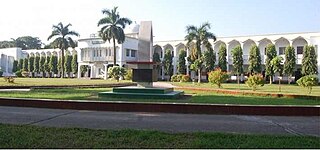
Rajshahi Cadet College, formerly known as Ayub Cadet College, is a military high school, located in Sardah, Rajshahi, Bangladesh. It is situated by the bank of river Padma at Mukhtarpur village of Sardah in Charghat of Rajshahi District of the northern region of Bangladesh.
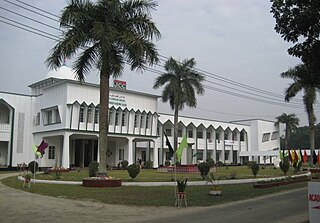
Jhenaidah Cadet College (JCC) is an English version military boarding school located in the outskirts of Jhenidah in Bangladesh. It is one of twelve cadet colleges of Bangladesh. It has departments of Science and Humanities.

Faujdarhat Cadet College is a historic public military high school being the first of its kind in Bangladesh and second in entire Pakistan, modelled after public schools in the UK, run following the national curriculum of Bangladesh in English version, financed partially by the Bangladesh Army, located at Faujdarhat, near Chattogram, in Bangladesh.

Dhaka Residential Model College, also known as DRMC, is a historic public autonomous residential school, located at Mirpur Road, Mohammadpur, Dhaka, Bangladesh. The college offers education for students from third grade to twelfth grade. DRMC is the largest residential public school and college in the country.
Sainik School Amaravathinagar is a Boys and Girls English medium, residential public school with a military bias up to +2 stage as per the CBSE board Syllabus. It is one of the 33 Government aided Sainik Schools in India, located in Udumalpet, Tiruppur district of Tamil Nadu.

Pakistan Air Force college Lower Topa is an all-boys military boarding school situated at Lower Topa,Murree which is located near Patriata in the Murree region of the Murree District of Pakistan. Situated on a hilltop, the institution is made up of a series of buildings. These comprise the boarding lodgings, academic blocks, hobbies section, laboratories, administration, library, hospital, etc. The other buildings consist of a mosque, a general purpose hall, an auditorium and a messing block. The public school serves as a nursery for the future leadership of the Pakistan Air Force. A new academic block has just been completed in 2017. Admission is open for all Pakistani students.

Motijheel Government Boys' High School And College is located at Outer Circular Road, Motijheel, Dhaka, Bangladesh. It was established in 1957 as 'Motijheel Central Government High School'. The students of the school liked to call this school 'Centralian'. The school campus is 7.5 acres with 2 big playgrounds. It was founded by Mr. Sayed Anwar Ahmed. He was the first headmaster of this school.
Knox College is a co-educational high school for both day pupils and boarders in Clarendon Parish, Jamaica. The other institutions that form the complex are: the Neighbourhood Early Childhood Institute, Knox Junior School, and Knox Community College. It was co-founded by Rev. Dr. Lewis Davidson and Mr. David Bent in 1947 and is named after John Knox.

Rashtriya Military School, Dholpur is one of five military schools of India. It is situated in Dholpur in Rajasthan and was established in 1962 by a former defence minister, Krishnan Menon, to facilitate education of the children of the Defense personnel as well as the civilians. Military Schools in India were previously known as King George Royal Indian Military College.
Cadet College Ghotki is an educational institution from grade 7 to grade 12, in the northern province of Sindh, Pakistan. It is jointly run by the Government of Sindh and the Pakistan Army.
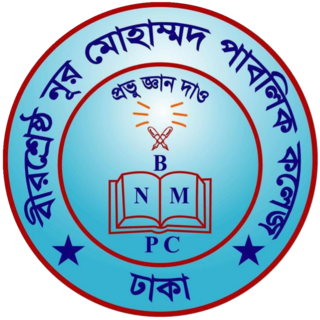
Birshreshtha Noor Mohammad Public College (BNMPC) is a Bangladeshi school and college located at the headquarters of Border Guard Bangladesh in Pilkhana. Although originally established to ensure the education of the children of Border Guards Bangladesh members but civilians can also study here. Major General Shakil Ahmed is the chief patron of the college, Brigadier General Benazir Ahmed is the chairperson of the governing body, and Lieutenant Colonel Md. Abu Sayed is the principal.

Command Secondary Schools are secondary schools under the Nigerian Army Education corps.




